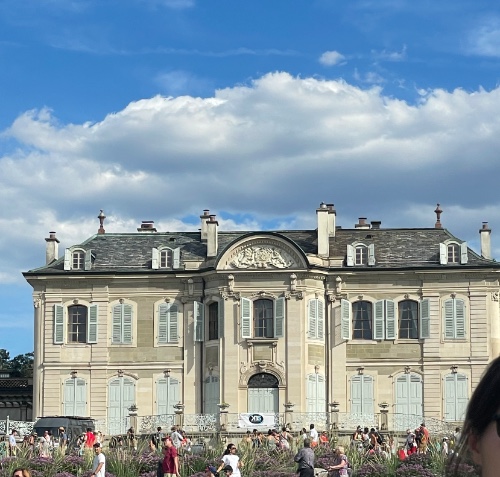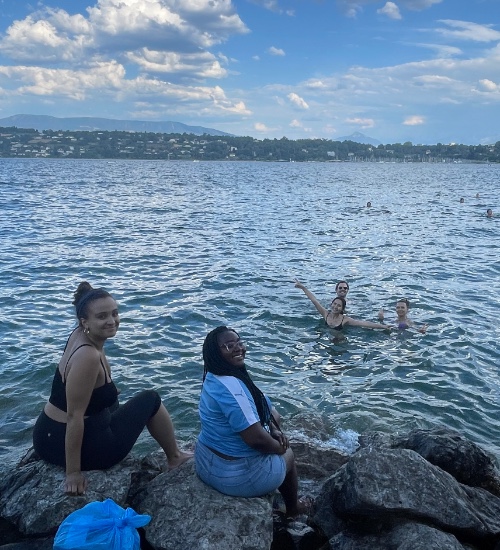Ch. 9 - Swiss National Day

The weekend leading up to my 9th week at IBJ was a long weekend, thanks to Monday (August 1st) being Swiss National Day. A fun-fair called LunaPark was set up alongside the lake, where it will stay for the next two weeks, filled with carnival games, fair rides, and concession stands. Kyle, Isa, and I ate dinner at Bains de Pâquis and spent the evening at the fair, crammed between droves of children and parents while carnival music blared in the background. On Sunday night, I walked through the fun-fair again before going to an open-air movie showing organized by the city. Over a thousand people sat in front of the giant  projector screen, sprawled out upon picnic blankets and lawn chairs, to watch a showing of Fargo that started as the sun went down. I only stayed for the first thirty minutes, as it was getting late—after all, the sun doesn’t set in Geneva until 10PM, and the movie had over an hour left.
projector screen, sprawled out upon picnic blankets and lawn chairs, to watch a showing of Fargo that started as the sun went down. I only stayed for the first thirty minutes, as it was getting late—after all, the sun doesn’t set in Geneva until 10PM, and the movie had over an hour left.
On Monday, I met Monique, Talia, and Isa at Parc La Grange for Swiss Day festivities. It was nice to see Talia, who had been on a week-long camping trip around Switzerland since her last day at IBJ. We got dinner and ice cream at the food stands, watched a couple rounds of Swiss wrestling, and listened to a patriotic group of alpine horn players. The climax of the evening came when a daredevil Genevois man traversed the lake on a tightrope suspended between two cranes. After he made it to the other side of the lake, I went home to prepare for work the next day.

In the office, I am working on the section of the India Defense Manual regarding juvenile clients. This has been particularly interesting because the law regarding juvenile defendants has changed quite drastically since this manual was last completed in 2008. These changes were spurred by the Nirbhaya case of 2012, where a young woman was gang raped and brutally murdered by 6 men, one of whom was a 17-year-old. While the five other men were sentenced to death and executed, the juvenile offender got the maximum sentence available at the time—only three years. The public was outraged at this leniency, and the law was subsequently changed in response to this sentiment. The Juvenile Justice Act of 2015 permitted juveniles over the age of 16 to be tried as adults when they are accused of “heinous” crimes. The case also led to the passage of POSCO (The Protection of Children from Sexual Offenses) Act, which permits the death penalty to be used as a punishment in cases of aggravated sex crimes. While many non-profits, advocacy groups, and others in the international sphere were outraged with the passage of these acts, which they believed to be regressive and overly punitive, it is worth noting that they were passed at the behest of an incensed population. The Nirbhaya case sparked mass demonstrations of people enraged at the number of violent crimes being committed against women. Confronting this issue through the lens of an international NGO, specifically one that focuses on Rule of Law and rights of the accused, has reminded me of why paternalistic applications of western morals are useless without consideration to a country’s socio-political environment and history. A consensus on international standards for human rights will never be met if only idealistically similar countries are allowed to have input. Thus, although I also do not believe that juvenile offenders should be subjected to life sentences or the death penalty, I can appreciate and relate to the sentiment that led to the passage of these two acts by India’s legislature.
This week was, again, filled with goodbyes at IBJ. We had small gatherings after work on Wednesday and Friday, first to say goodbye to Daniella (who would be missing the event on Friday), and afterwards to mark the last day of Monique, Kyle, and myself. Kyle and I actually are actually going to be working for one more week, but everything will be remote because the office is going to be under renovation. On both of these days, a group of interns stayed late singing karaoke until we were finally all kicked out of the office. On Friday, Kyle, Isa, and I made plans to meet at Le Barje at around 8. The second we arrived to the outdoor bar, however, we started feeling raindrops. We, along with the rest of the bar's patrons, ran to take cover in a nearby tunnel–by the time we reached it, rain was coming down in torrents. And in a completely European fashion, someone in the graffiti-covered tunnel switched on a speaker and began playing house music. As this group of huddled-together, rain-drenched strangers erupted into a spontaneous dance party, I joined them while reflecting on all the reasons I will miss this incredibly city.
